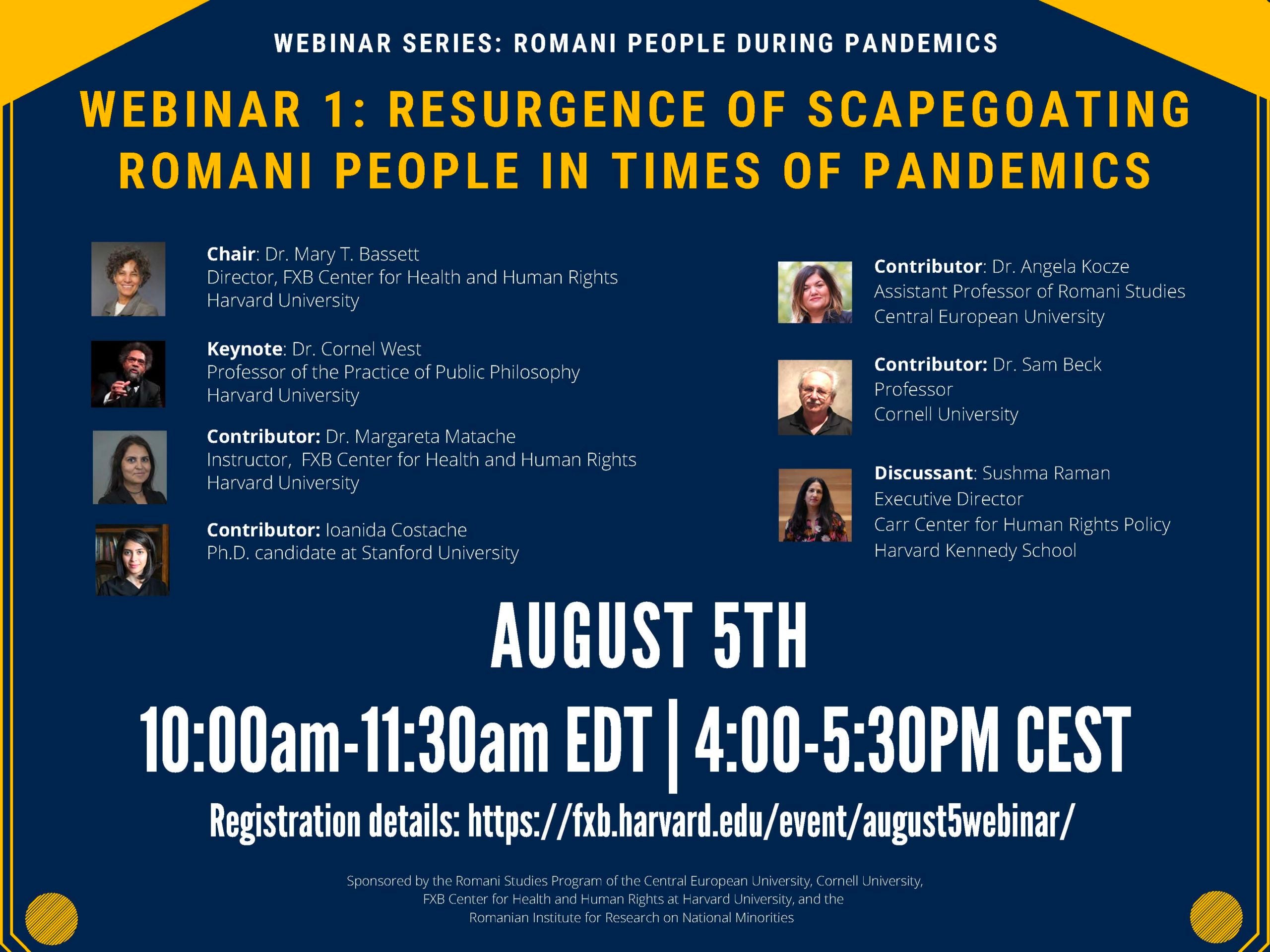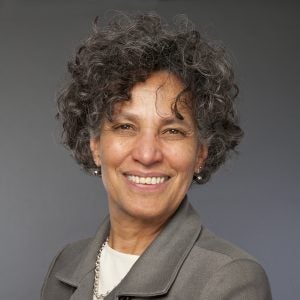
On August 5, 2020, leading scholars and activists will discuss the additional challenges and risks Romani people are facing during the COVID-19 pandemic during a webinar, “Resurgence of Scapegoating Romani People in Times of Pandemics.” The event will be held from 10 to 11:30 a.m. EDT (4 to 5:30 p.m. CEST). To register, click here.
Speakers

Chair | Dr. Mary T. Bassett, Director, FXB Center for Health and Human Rights at Harvard University
With more than 30 years of experience in public health, Dr. Mary T. Bassett has dedicated her career to advancing health equity. Dr. Bassett is currently the Director of the François-Xavier Bagnoud (FXB) Center for Health and Human Rights at Harvard University and the FXB Professor of the Practice of Health and Human Rights at the Harvard T.H. Chan School of Public Health. Prior to joining the FXB Center, she served as New York City’s Commissioner of Health from 2014 to 2018.
Dr. Bassett’s many awards and honors include the prestigious Frank A. Calderone Prize in Public Health, a Kenneth A. Forde Lifetime Achievement Award from Columbia University, and election to the National Academy of Medicine.
She received her B.A. in History and Science from Harvard University and her M.D. from Columbia University’s College of Physicians and Surgeons. She served her medical residency at Harlem Hospital Center and has a master’s degree in Public Health from the University of Washington, where she was a Robert Wood Johnson Clinical Scholar.

Keynote | Cornel West, Professor of the Practice of Public Philosophy at Harvard University
Cornel West is a prominent and provocative democratic intellectual. He is Professor of the Practice of Public Philosophy at Harvard University and holds the title of Professor Emeritus at Princeton University. He has also taught at Union Theological Seminary, Yale, Harvard, and the University of Paris. Cornel West graduated Magna Cum Laude from Harvard in three years and obtained his M.A. and Ph.D. in Philosophy at Princeton.
He has written 20 books and has edited 13. He is best known for his classics, Race Matters and Democracy Matters, and for his memoir, Brother West: Living and Loving Out Loud. His most recent book, Black Prophetic Fire, offers an unflinching look at nineteenth and twentieth-century African American leaders and their visionary legacies.
Dr. West is a frequent guest on the Bill Maher Show, CNN, C-Span and Democracy Now. He made his film debut in the Matrix – and was the commentator (with Ken Wilbur) on the official trilogy released in 2004. He also has appeared in over 25 documentaries and films including Examined Life, Call & Response, Sidewalk and Stand.
He has produced three spoken word albums including Never Forget, collaborating with Prince, Jill Scott, Andre 3000, Talib Kweli, KRS-One and the late Gerald Levert. His spoken word interludes are featured on productions by Terence Blanchard, The Cornel West Theory, Raheem DeVaughn, and Bootsy Collins.
In short, Cornel West has a passion to communicate to a vast variety of publics in order to keep alive the legacy of Martin Luther King, Jr. – a legacy of telling the truth and bearing witness to love and justice.

Contributor | Margareta Matache, Instructor, FXB Center for Health and Human Rights at Harvard University
Margareta (Magda) Matache is a justice activist and scholar from Romania, director of the FXB Center for Health and Human Rights’ Roma Program, and a Harvard instructor. From 2005 to 2012, Dr. Matache was the Executive Director of Romani CRISS, a leading Roma rights organization that defends the rights of Roma. In 2012, she was awarded a Hauser postdoctoral fellowship at the FXB Center, where she founded the University’s first and only Roma Program.
In 2017, with Jacqueline Bhabha and Andrzej Mirga, she co-edited Realizing Roma Rights, an investigation of anti-Roma racism in Europe. Also, along with Jacqueline Bhabha, Caroline Elkins, and Walter Johnson, Dr. Matache is the co-editor of Time for reparation? Addressing state responsibility for collective injustice, a forthcoming volume exploring the issue of reparations across a broad range of historical and geographic contexts and academic disciplines.
She completed her Master’s in Public Administration from the John F. Kennedy School of Government at Harvard University, and her doctoral degree in Political Sciences from the Faculty of Political Sciences at the University of Bucharest.

Contributor | Ioanida Costache, Ph.D. candidate at Stanford University
Ioanida Costache is a PhD candidate in ethno/musicology at Stanford University and a Roma activist. Her research explores issues of race and ethnicity, the performance/construction of identity, cultural memory, trauma, and history as they intersect in Romanian-Romani musico-oral traditions. Her writing has been published in Critical Romani Studies, Bridge Magazine, Baricade and Decat o Revista. Her research has been funded by the American Councils Research Scholar Program, the Fulbright Program and the Council for European Studies among others. She holds visiting fellowships at USC Shoah Foundation Center for Advanced Genocide Research and the Jack, Joseph and Morton Mandel Center for Advanced Holocaust Studies at the U.S. Holocaust Museum.

Contributor | Angéla Kóczé, Assistant Professor of Romani Studies, Central European University
Angéla Kóczé is an Assistant Professor, Acting Chair of Romani Studies, and Academic Director of the Roma Graduate Preparation Program at Central European University in Budapest, Hungary. In 2013–2017, she was a Visiting Assistant Professor in the Department of Sociology and Women’s, Gender and Sexuality Studies Program at Wake Forest University in Winston Salem, NC, USA. She has published several peer-reviewed articles and book chapters with various international presses, including Palgrave Macmillan, Ashgate, Routledge and CEU Press, as well as several thematic policy papers related to social inclusion, gender equality, social justice and civil society. In 2013, the Woodrow Wilson International Center for Scholars in Washington, DC, honoured Kóczé with the Ion Ratiu Democracy Award for her interdisciplinary research approach, which combines community engagement and policymaking with in-depth participatory research on the situation of the Roma. She is a co-editor of The Romani Women’s Movement: Struggles and Debates in Central and Eastern Europe (Routledge, 2019, with Violetta Zentai, Jelena Jovanović and Enikő Vincze) and The Roma and their Struggle for Identity in Contemporary Europe (Oxford: Berghahn, 2020, with Huub van Baar).

Contributor | Sam Beck, Professor, Cornell University
Sam Beck is an anthropologist with a long-standing interest in inter-group relations. He is the Director of the Cornell University Urban Semester Program and Senior Lecturer. He is the editor of the Berghahn Books Romani Studies book series. He published with Ana Ivasiuc an edited volume, Renewing Research and Romani Activism. With Carl Maida, he edited Global Sustainability and Communities of Practice, Public Anthropology in a Borderless World, and Toward Engaged Anthropology. He published Manny Almeida’s Ringside Lounge: The Cape Verdean Struggle for their Neighborhood. With John W. Cole he published an edited volume, Ethnicity and Nationalism in Southeastern Europe. His articles range from private uncollectivized Romanian peasants, the history of Roma slavery in Romania, to Community Service-Learning and the changing population and physical environment of Williamsburg, Brooklyn.

Discussant | Sushma Raman, Executive Director, the Carr Center for Human Rights Policy, Harvard Kennedy School
Sushma Raman is the Executive Director of the Carr Center for Human Rights Policy. She brings over two decades of global experience launching, scaling, and leading social justice and philanthropic programs and collaboratives, building capabilities of grassroots human rights organizations and their leaders, and teaching graduate courses in the public policy schools at UCLA, USC, and Harvard Kennedy School.
Sushma has worked at the Ford Foundation, where she managed a $100 million global program (the second largest in the Foundation’s history at that time) where she helped launch and scale social justice and women’s funds around the world, and at the Open Society Foundation, where she was a Program Officer on the founding staff for US Programs, staffing a $50 million fund established by philanthropist George Soros to support immigrant and refugee rights.
Sushma is the co-author, along with Bill Schulz (former executive director of Amnesty International USA and Carr Center Senior Fellow), of the book The Coming Good Society: Why New Realities Demand New Rights, released by Harvard University Press in June 2020. This forward-looking book examines the coming changes to the human rights landscape and argues that rights must adapt to new technological and scientific realities or risk being consigned to irrelevance.
Sushma is the host of the Carr Center’s Justice Matters podcast, a contributor to Foreign Policy magazine, and a facilitator for many Carr Center events, including the Human Rights in Hard Places and the Struggle for Black Lives series. She was a Fellow with the German Marshall Fund and the UCLA Luskin School, and is currently a member of the board of RFK Human Rights, established by the family of Bobby Kennedy. She has taught graduate courses on inter-sectoral leadership; philanthropy and nonprofit management; global civil society, the NGO sector, and the state; and policy communications for decision makers.
Born and raised in India, Sushma has a BA in Economics from Smith College, a M.A. in African Studies from UCLA, and a midcareer MPA from the Harvard Kennedy School, where she was awarded the Lucius N. Littauer Fellowship for her academic and leadership achievements.
The webinar will be streamed live on the FXB Center’s Facebook page. This event is the first in the four-part webinar series, “Romani People During Pandemics.” The webinar series will:
- Discuss past and present patterns of fearing or blaming Roma during pandemics and place these patterns in the broader history of scapegoating in times of crisis.
- Draw attention to various responses chosen by state representatives and their rationale. We will discuss discriminatory measures by local or state institutions who imposed Roma-only, disproportionate, or militarized measures in Romani neighborhoods or towns.
- Focus on effective responses implemented at local, national, or international levels by state and non-state actors to protect Romani people, their health and well-being in times of pandemic and outside of them.
Upcoming Webinars
Please save these dates for future webinars in this series (more details coming soon):
Anti-Romani Racism During COVID-19 Pandemic
September 2, 2020 from 4 to 5:30 pm CEST / 10 to 11:30 a.m. EDT
Structural Inequalities as Risk Factors during Pandemic
September 14, 2020 from 4 to 5:30 pm CEST / 10 to 11:30 a.m. EDT
Responses to COVID-19 at Local, National, and International Levels
October 8, 2020 from 3 to 4:30 pm CEST / 9 to 10:30 a.m. EDT
This webinar series is being organized by the FXB Center for Health and Human Rights at Harvard University, the Romani Studies Program of the Central European University, the Romanian Institute for Research on National Minorities (ISPMN), and Cornell University.









